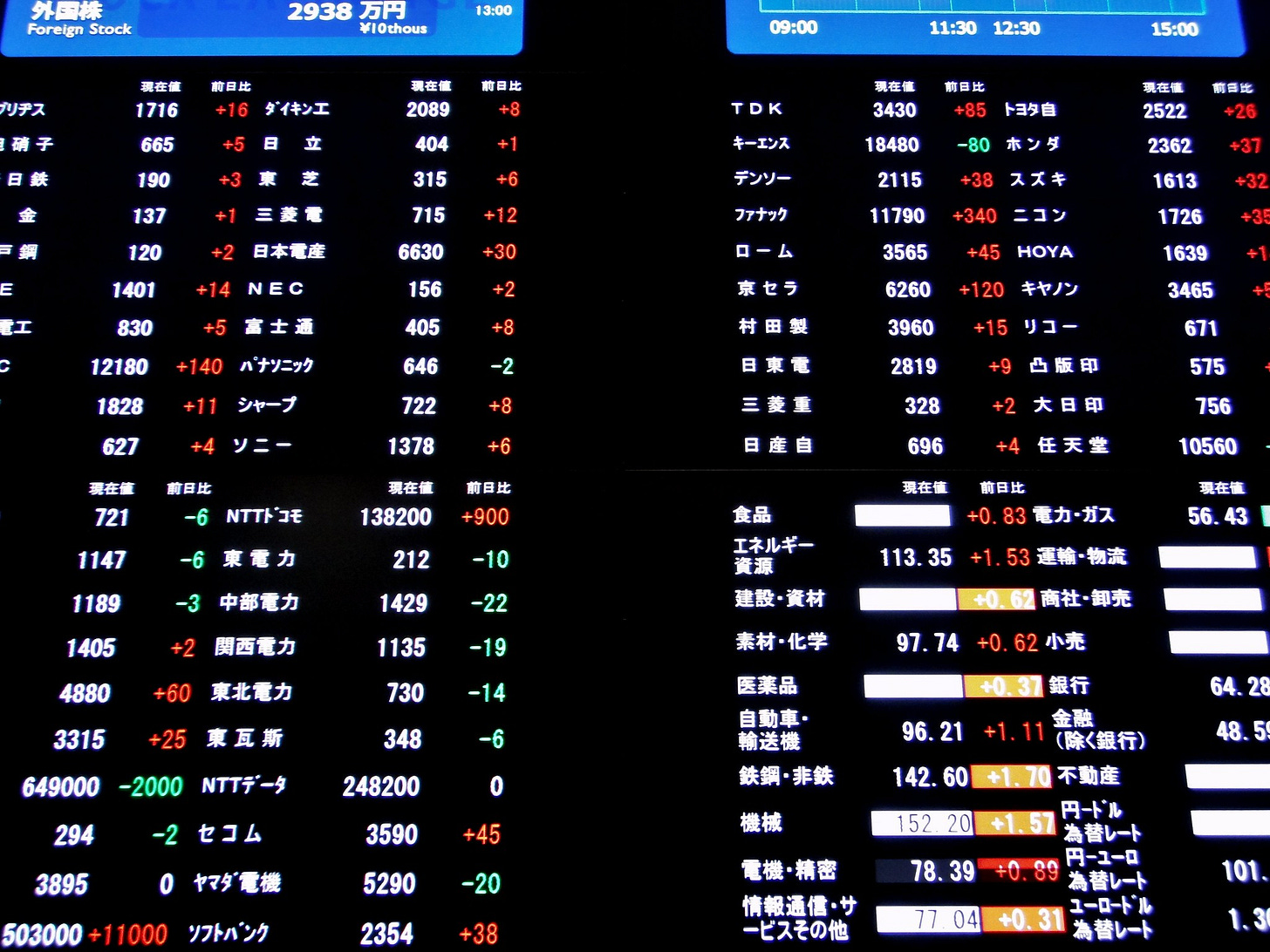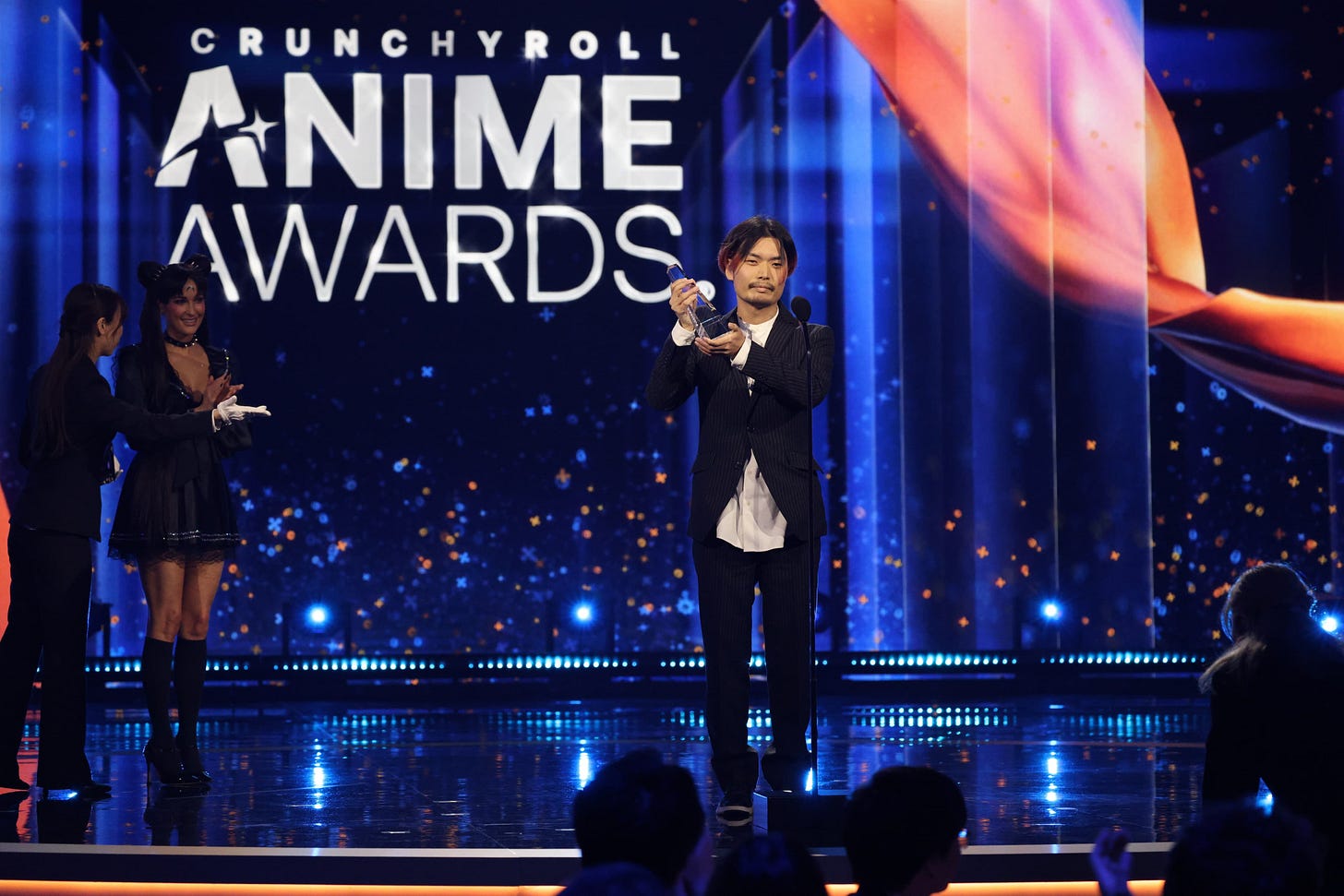Anime companies report sales growth abroad
Plus: Animenomics announces strategic partnership; 'Solo Leveling', 'Look Back' win Crunchyroll Anime Awards; Anime studios approach AI tech with caution; and more
This is your weekly Animenomics briefing, covering the business of anime and manga. Today is Wednesday, May 28, 2025.
An announcement: Animenomics is entering into a partnership agreement with New Jersey-based digital entertainment startup Curation Entertainment Partners.
Our companies will share resources in strategic business development, marketing, and sales to support growth of both the Animenomics newsletter and Curation Entertainment’s B!JuKu creator platform.
Markets abroad drive sales growth for anime companies

Many companies involved in anime planning and production publish earnings results in May for the fiscal year that ended March 2025. Below is a selection of insights from recent earnings reports.
Sony Group Corporation chief executive officer Hiroki Totoki says, “We will leverage PlayStation Network’s monetization capabilities to enhance Crunchyroll service,” after telling the Financial Times last year that just 5 percent of PlayStation customers have Crunchyroll accounts.
Sony Pictures, which includes Crunchyroll, saw net sales inch up 1 percent year-over-year on a yen basis and fall 4 percent on a United States dollar basis.
The business segment’s full-year operating income was essentially flat compared to last year, but fourth quarter profit jumped 74 percent on a yen basis.
For next year, chief financial officer Lin Tao forecasts, “We expect operating income to grow approximately 10 percent year-on-year on a U.S. dollar basis, excluding the impact of foreign exchange rates, primarily driven by Crunchyroll.”
Kadokawa Corporation saw full-year anime-related sales jump more than 16 percent to ¥37.3 billion (US$258 million)) with strong performances by the second season of Oshi no Ko and the third season of Re:Zero - Starting Life in Another World.
Full-year non-consolidated sales related to the Oshi no Ko anime series stood at ¥5.8 billion (US$40.5 million), bringing the two-year total for the series to ¥9.4 billion (US$65.6 million).
Figure skating anime series Medalist, based on a Kodansha manga series, helped drive streaming rights sales in the fourth quarter up 8.8 percent.
The company forecasts that both the publishing and anime and film segments will hit their March 2028 net sales targets by next year.
What we’re watching: Kadokawa is expanding global merchandise sales and international events, such as the current Ryoko Kui Exhibition & Delicious in Dungeon Exhibition in Hong Kong.
Bandai Namco Holdings net sales climbed more than 18 percent in the 2024 fiscal year right after breaking ¥1 trillion in sales for the first time in the company’s history the year before.
Despite posting the seventh consecutive year of growth in the toys and hobby business, i.e. trading card games, Gundam robot plastic model kits, and capsule toys, the company expects costs to increase.
“Due to differences in commercial distribution between North America and Japan, our business model involves holdings a relatively large amount of inventory, so we have not seen a significant impact [from tariffs by the United States] at this time,” the company says.
Between the lines: While Bandai Namco makes its Gundam robot plastic model kits and trading cards in Japan, character figurines and other products are made in China, so prices on some merchandise will rise if the trade war drags on.
Avex reported that its anime and films business grew full-year net sales by nearly 15 percent year-over-year to ¥18.5 billion (US$128 million).
The share of home video sales in the segment has more than halved in the last two years and now make up less than 10 percent of the segment’s revenue.
Yes, but: “Our earnings were below expectations as the acquisition of strong IP from outside the Group and the creation of big hits fell below our plan,” Avex says.
Avex’s Anime Times channel on Amazon’s Prime Video service saw annual total viewing time grow 63 percent year-over-year to 57 million hours as it doubled the number of anime titles distributed on the channel in India.
Toei Animation posted record net sales and operating profit for the 2024 fiscal year, with rights licensing sales outside Japan growing 39 percent year-over-year and overseas animation sales up more than 15 percent.
Dragon Ball-related animation sales outside Japan were up 68 percent year-over-year, and overseas rights licensing sales were up nearly 38 percent with the airing of Dragon Ball Daima.
Nippon TV Holdings reported a 9 percent year-over-year decline in anime-related net sales to ¥6.1 billion (US$42 million) as the effects of last year’s dual success in Frieren: Beyond Journey’s End and The Apothecary Diaries wear off.
International anime-related sales fell 22 percent to ¥3.2 billion (US$22 million), accounting for about 52 percent of total anime revenue.
TV Tokyo Holdings saw a 10 percent increase in its anime rights licensing business to ¥23.1 billion (US$160 million) thanks to sales of streaming rights of Spy × Family and overseas merchandising rights of Naruto.
Zoom in: TV Tokyo has named anime as one of four pillars of its growth strategy through 2035, and anime is expected to become the broadcaster’s primary growth engine over the next three years.
What we’re watching: The broadcaster has commissioned Paris-based mobile development studio Yonko, doing business as Sekai, to create official consumer apps for the Naruto franchise.
TBS Holdings saw anime-related net sales jump 65 percent year-over-year to ¥1.77 billion (US$12.2 million), driven by growth in rights sales related to The Quintessential Quintuplets.
Anime-related operating profit fell 22 percent as the broadcaster increases anime production investments.
As reported by Animenomics last week, TBS will also invest ¥30 billion (US$208 million) to establish an anime IP planning company with Mainichi Broadcasting.
TV Asahi Holdings saw growth in both its Doraemon and Crayon Shin-chan anime properties in recent years, but the company is signaling that it isn’t planning to make any significant changes in their overseas expansion initiatives.
As previously reported by Animenomics, the broadcaster is anticipating a big year in India as back-to-back Crayon Shin-chan anime films are released in theaters for the first time.
Fuji Media Holdings reported that Fuji Television’s anime development business saw full-year net sales grow 55 percent to ¥6.16 billion (US$42.6 million) thanks to strong sales of streaming rights abroad.
Fuji Media’s Pony Canyon unit, however, saw full-year net sales fall 5 percent as anime home video sales were sluggish.
Shogakukan full-year net sales inched up 0.8 percent year-over-year, while net profit jumped 70 percent.
Print manga sales fell more than 19 percent to just below ¥10 billion (US$69 million), while overall digital revenue was up 2.2 percent. Sales of copyright licensing saw strong performance, climbing 26.8 percent.
Marui Group reported that it now has more than 1.1 million customers using anime, manga, and video game co-branded credit cards, exceeding the 1 million cardholders target the company initially set for next year.
As previously reported by Animenomics, Marui says customers who own co-branded cards generate two to seven times more profit than ordinary cardholders.
Clippings: Crunchyroll names Anime Awards winners

Solo Leveling and Look Back were named Anime of the Year and Film of the Year, respectively, at the ninth annual Crunchyroll Anime Awards. (The Hollywood Reporter)
Blackstone-owned Infocom Holdings will assume the intellectual property rights and debt obligations of its subsidiary Amutus, which operates digital manga platform Mecha Comic and web novel platform Everystar, dissolving the subsidiary. (Gamebiz)
Rewind: The move to focus Infocom’s operations on the digital manga and web novel business comes after the company sold its IT services arm last month.
Annecy International Animation Film Festival is seeing an increase in pitches from Japan this year. The number of works that incorporate Japanese elements, e.g. music by Japanese composers, is also growing. (Animation Business Journal)
Heavy machinery manufacturer Yanmar established a subsidiary to promote its new anime character merchandise business and conduct brand consulting for internal and external clients. (Nikkei xTREND)
Digital advertising giant CyberAgent will develop anime- and video game-themed hotels and cafes with real estate development subsidiary RealGate, which it acquired in 2021, to attract foreign tourists visiting Japan. (The Nikkei)
CyberAgent’s anime and IP business will join Chinese social media service Weibo in creating an anime-focused landing page on the platform and collaborating on offline events to promote anime in China and the rest of Asia. (Press release)
Anime studios cautious on AI tech amid labor concerns
“A major reason Japanese anime has been highly praised overseas is the expressiveness of hand-drawn images. But if you replace that with AI, anyone can make Japanese-style anime. Aren’t we shooting ourselves in the foot?”
— Ayano Fukumiya, Nippon Anime & Film Culture Association secretary-general
Context: Speaking with the Nikkei financial newspaper, Fukumiya echoes a concern among many studio workers in Japan’s anime industry about unanswered rights issues related to the use of generative artificial intelligence in anime production.
Catch up quick: In March, several Japanese broadcasters aired for the first time on television an anime produced with the assistance of AI tools, Twins Hinahima, renewing discussions about the role of AI in anime production.
“Talking about AI has become taboo, but I felt that it had the potential to solve problems in the anime world,” Naomichi Iizuka, chief content officer at KaKa Creation, whose studio produced Twins Hinahima, tells the Nikkei.
As previously reported by Animenomics, a 2023 survey conducted by the Nippon Anime & Film Culture Association found that a majority of anime industry workers favor some sort of regulation on the use AI.
Zoom out: Toei Animation was forced to revise its year-end earnings presentation last week after a slide about the company’s investment in AI startup Preferred Networks was misinterpreted by observers as an indicator that AI technology was used in the making of the Pretty Cure anime series.
Animenomics is an independently run and reader-supported publication. If you enjoyed this newsletter, consider sharing it with others.


